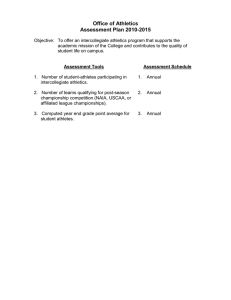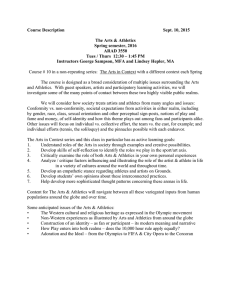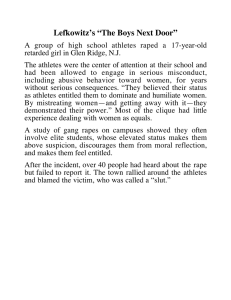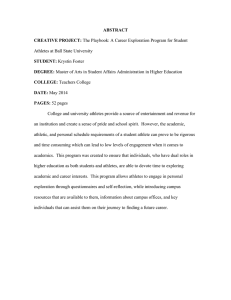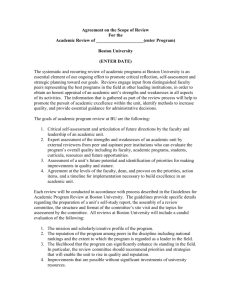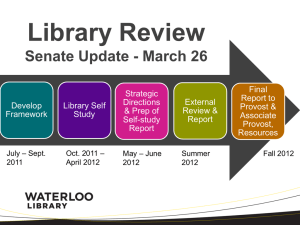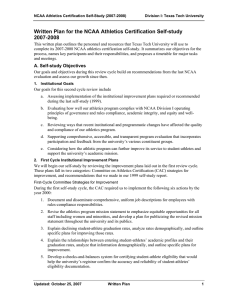Provost's Advisory Council Summary of March 27, 2008 meeting Attending:
advertisement
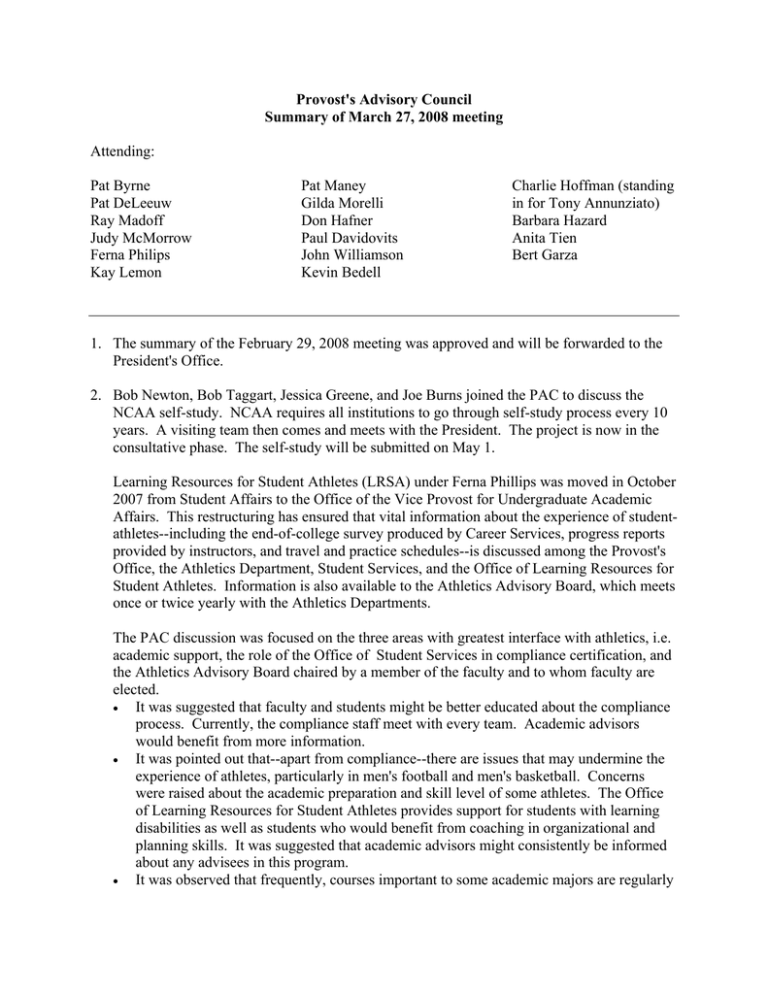
Provost's Advisory Council Summary of March 27, 2008 meeting Attending: Pat Byrne Pat DeLeeuw Ray Madoff Judy McMorrow Ferna Philips Kay Lemon Pat Maney Gilda Morelli Don Hafner Paul Davidovits John Williamson Kevin Bedell Charlie Hoffman (standing in for Tony Annunziato) Barbara Hazard Anita Tien Bert Garza 1. The summary of the February 29, 2008 meeting was approved and will be forwarded to the President's Office. 2. Bob Newton, Bob Taggart, Jessica Greene, and Joe Burns joined the PAC to discuss the NCAA self-study. NCAA requires all institutions to go through self-study process every 10 years. A visiting team then comes and meets with the President. The project is now in the consultative phase. The self-study will be submitted on May 1. Learning Resources for Student Athletes (LRSA) under Ferna Phillips was moved in October 2007 from Student Affairs to the Office of the Vice Provost for Undergraduate Academic Affairs. This restructuring has ensured that vital information about the experience of studentathletes--including the end-of-college survey produced by Career Services, progress reports provided by instructors, and travel and practice schedules--is discussed among the Provost's Office, the Athletics Department, Student Services, and the Office of Learning Resources for Student Athletes. Information is also available to the Athletics Advisory Board, which meets once or twice yearly with the Athletics Departments. The PAC discussion was focused on the three areas with greatest interface with athletics, i.e. academic support, the role of the Office of Student Services in compliance certification, and the Athletics Advisory Board chaired by a member of the faculty and to whom faculty are elected. • It was suggested that faculty and students might be better educated about the compliance process. Currently, the compliance staff meet with every team. Academic advisors would benefit from more information. • It was pointed out that--apart from compliance--there are issues that may undermine the experience of athletes, particularly in men's football and men's basketball. Concerns were raised about the academic preparation and skill level of some athletes. The Office of Learning Resources for Student Athletes provides support for students with learning disabilities as well as students who would benefit from coaching in organizational and planning skills. It was suggested that academic advisors might consistently be informed about any advisees in this program. • It was observed that frequently, courses important to some academic majors are regularly • • taught at times that that cannot be easily reconciled with practice times and/or travel schedules. Science courses and nursing and education courses (due to practica) can be particularly difficult for student-athletes to elect. These situations are dealt with on a case-by-case basis, and coaches make exceptions. It was also observed that many “redshirt” athletes use their fifth year at BC to complete master's degrees. It was pointed out that many athletes have developed habits that are conducive to academic success, such as an understanding that repetitive practice is required for success in difficult tasks, an ability to focus on an activity. Next steps in the consultative phase: • The self-study will be placed on reserve in O'Neill, and three excerpted sections will be put online. • A full copy of the self-study is being provided to the members of the Athletic Advisory Board. • An undergraduate member of the self-study group will meet with members of the UGBC. Another member of the self-study group will meet with the Student Athletics Advisory Committee. • There will be an open forum in which any member of the University community may participate. 3. The Council discussed course-based and credit-based methods of tracking progress toward completion. It was noted that changing to a credit-based degree system might enable departments to exercise greater creativity in their curricula and provide greater flexibility to students and faculty. If the University makes a transition to a credit-based system, several issues remain to be addressed, including: how the University and schools might approach questions of teaching loads; credit minima (currently nearly 50% of all graduating seniors earn more than 114 credits); and uniformity among schools in numbers of credits required toward the degree. • • • • • A faculty member forwarded to the Council a question about internships possibly being overvalued. It was observed that clear guidelines for departments and coordination across the University would be important in assessing the credit value of courses. It was pointed out that it would be beneficial to have maxima as well as minima to be established for how many credit hours may be completed over the course of one semester, thereby prompting a rethinking of normative progress toward degree completion. It was noted that a credit-based system would probably require formation of curriculum committees at the school and university levels, to review new and existing courses and ensure uniformity in the credit-value given to courses and greater harmony among courses in credits assigned to each. It was observed that the Associate Deans are in favor of making this transition. 4. It was proposed that the next PAC meeting discuss acquisitions in the Library.
